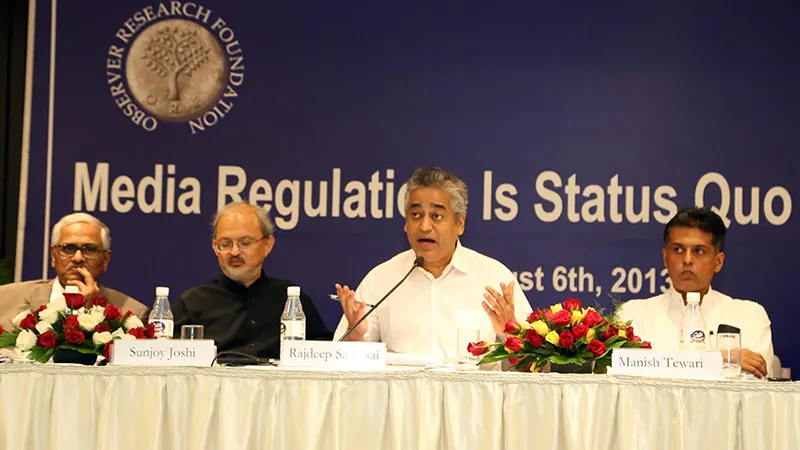-
CENTRES
Progammes & Centres
Location
Media Regulation: Is Status Quo the Answer? This was the topic of an interesting panel discussion organised by Observer Research Foundation and The Hammurabi & Solomon at the India International Centre on August 6.

Media Regulation: Is Status Quo the Answer? This was the topic of an interesting panel discussion organised by Observer Research Foundation and The Hammurabi & Solomon at the India International Centre on August 6.
The main speakers were Mr Manish Tewari, the Minister for Information and Broadcasting, Justice Markandey Katju, the Chairman of the Press Council of India (PCI), Justice R.V. Raveendran, Chairperson, News Broadcasting Standards Authority (NBSA) and Justice A.P. Shah, Chairperson of Broadcasting Content Complaints Council (BCCC). It was moderated by Mr Rajdeep Sardesai, the Editor-in-Chief of IBN 18 Network.
The conference was attended by senior journalists, representatives of the media houses, owners, legal experts and others.
Majority of the participants, including some speakers, favoured statutory regulation to see free and healthy flow of right information.
Justice Katju stated his support to the over-arching philosophies of freedom of the media and media persons already enshrined in the draft bill and expanded on his stated position regarding the need for an omnibus and statutory media council covering the entire spectrum of media products.
Justice Raveendran quoted extensively from the Chief Justice of India’s remarks on media freedoms and supported stronger self regulation (already mentioned in the draft bill as tier 1). He, however, did not support a state-mandated regulator of any kind.
Justice Raveendran underscored the present-day gap in such a regime where a large body of news providers are not part of the NBA and thus needn’t conform to NBSA rulings and advisories. He therefore suggested that the Ministry of Information and Broadcasting should officially recognise the jurisdiction of NBSA for all news providers, irrespective of their membership of the NBA.
Justice Shah apprised the audience of the comprehensive measures the BCCC under him is taking as part of its commitment to viewers. He then flagged the need to give statutory teeth to voluntary self regulation (this is provided in the draft bill).
Endorsing the broad philosophies and immediacy of reviewing the status quo, Mr Manish Tewari went on to raise searching questions on challenges posed by the proliferation of smart phones and the dawn of an era where each subscriber is a ’broadcaster’ and various countries may start using the internet furthers its arc of influence. The minister assured that the UPA government’s intent will never be to interfere with content. Conveying the Prime Minister’s clear instructions, Mr Tewari said, UPA’s relationship with the media will be "an essay in persuasion, never an essay in regulation."
ORF Director Sunjoy Joshi welcomed comments and suggestions to the draft Bill, which he described as work in progress.
A draft Bill, titled "Maintenance of Transparency and Code of Conduct and Prevention of Circulation, Publication or Broadcasting of Misleading Information by an Entity Engaged in Circulation, Publication or Broadcasting of News (by any medium) Bill, 2013", was circulated to the participants.
ORF and The Hammurabi & Solomon request suggestions/amendments, if any, to the draft Bill. This was the concluding round of the discussion on the subject. The first round was organised on January 14, 2013.
"Maintenance of Transparency and Code of Conduct and Prevention of Circulation, Publication or Broadcasting of Misleading Information by an Entity Engaged in Circulation, Publication or Broadcasting of News (by any medium) Bill, 2013"
The views expressed above belong to the author(s). ORF research and analyses now available on Telegram! Click here to access our curated content — blogs, longforms and interviews.